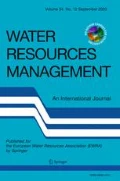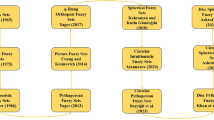Abstract
Multiple criteria analysis (MCA) is a framework for ranking or scoring the overall performance of decision options against multiple objectives. The approach has widespread and growing application in the field of water resource management. This paper reviews 113 published water management MCA studies from 34 countries. It finds that MCA is being heavily used for water policy evaluation, strategic planning and infrastructure selection. A wide range of MCA methods are being used with the fuzzy set analysis, paired comparison and outranking methods being most common. The paper also examines the motivations for adopting MCA in water management problems and considers future research directions.
Similar content being viewed by others
References
Abrishamchi A, Ebrahimian A, Tajrishi M, Marino MA (2005) Case study: application of multicriteria decision making to urban water supply. J Water Resour Plan Manage 131(4):326–335
Agrell PJ, Lence BJ, Stam A (1998) An interactive multicriteria decision model for multipurpose reservoir management: the shellmouth reservoir. J Multi-Criteria Decis Anal 7(2):61–86
Almasri MN, Kaluarachchi JJ (2005) Multi-criteria decision analysis for the optimal management of nitrate contamination of aquifers. J Environ Manag 74(4):365–381
Al-Rashdan D, Al-Kloub B, Dean A, Al-Shemmeri T (1999) Environmental impact assessment and ranking the environmental projects in Jordan. Eur J Oper Res 118(1):30–45
Bana e Costa CA, Antião da Silva P, Nunes Correia F (2004) Multicriteria evaluation of flood control measures: the case of Ribeira do Livramento. Water Resour Manag 18(3):263–283
Bana e Costa CA, De Corte JM, Vansnick JC (2005) On the mathematical foundation of MACBETH. In: Figueira J, Salvatore G, Ehrgott M (eds) Multiple criteria decision analysis: state of the art surveys. Springer, Berlin Heidelberg New York, pp409–442
Brans JP, Vincke PH, Marshal B (1986) How to select and how to rank projects: the PROMETHEE method. Eur J Oper Res 24:228–238
Brown K, Adger WN, Tompkins E, Bacon P, Shim D, Young K (2001) Trade-off analysis for marine protected area management. Ecol Econ 37(3):417–434
Buckley JJ (1984) The multiple judge, multiple criteria ranking problem: a fuzzy set approach. Fuzzy Sets Syst 13:25–37
Cai X, Lasdon L, Michelsen AM (2004) Group decision making in water resources planning using multiple objective analysis. J Water Resour Plan Manage 130(1):4–14
Chang NB, Wen CG, Chen YL (1997) A fuzzy multi-objective programming approach for optimal management of the reservoir watershed. Eur J Oper Res 99(2):289–302
Chuntian C, Chau KW (2002) Three-person multi-objective conflict decision in reservoir flood control. Eur J Oper Res 142:625–631
Cohon JL, Marks DH (1975) A review evaluation of multiobjective programming techniques. Water Resour Manag 11(2):208–220
Dunning DJ, Ross QE, Merkhofer MW (2000) Multiattribute utility analysis; best technology available; adverse environmental impact; Clean Water Act; Section 316(b). Environ Sci Policy 3:7–14
Eckenrode RT (1965) Weighting multiple criteria. Manage Sci 12(3):180–192
Eder G, Duckstein L, Nachtnebel HP (1997) Ranking water resource projects and evaluating criteria by multicriterion Q-analysis: an Austrian case study. J Multi-Criteria Decis Anal 6(5):259–271
Fernandes L, Ridgley MA, van’t Hof T (1999) Multiple criteria analysis integrates economic, ecological and social objectives for coral reef managers. Coral Reefs 18(4):393–402
Figueira J, Salvatore G, Ehrgott M (eds) (2005a) Multiple criteria decision analysis: state of the art surveys. Springer, Berlin Heidelberg New York, p 1045
Figueira J, Mousseau V, Roy B (2005b) ELECTRE methods. In: Figueira J, Salvatore G, Ehrgott M (eds) Multiple criteria decision analysis: state of the art surveys. Springer, Berlin Heidelberg New York, pp133–162
Gershon M, Duckstein L (1983) Multiobjective approaches to river basin planning. J Water Resour Plan Manage Div 109(1):13–28
Greiner R, Herr A, Brodie J, Haynes D (2005) A multi-criteria approach to Great Barrier Reef catchment (Queensland, Australia) diffuse-source pollution problem. Mar Pollut Bull 51(1–4):128–137
Hayashi K (2000) Multicriteria analysis for agricultural resource management: a critical survey and future perspectives. Eur J Oper Res 122:486–500
Haynes D (ed) (2001) Great barrier reef water quality: current issues. Great Barrier Reef Marine Park Authority, Townsville, Australia
Howard AF (1991) A critical look at multiple criteria decision making techniques with reference to forestry applications. Can J For Res 21:1649–1659
Hyde KM, Maier HR, Colby CB (2004) Reliability-based approach to multicriteria decision analysis for water resources. J Water Resour Plan Manage 130(6):429–438
Joubert AR, Leiman A, de Klerk HM, Katau S, Aggenbach JC (1997) Fynbos vegetation and the supply of water: a comparison of multi-criteria decision analysis and cost benefit analysis. Ecol Econ 22:123–140
Joubert A, Stewart TJ, Eberhard R (2003) Evaluation of water supply augmentation and water demand management options for the City of Cape Town. J Multi-Criteria Decis Anal 12(1):17–25
Karnib A (2004) An approach to elaborate priority preorders of water resources projects based on multi-criteria evaluation and fuzzy sets analysis. Water Resour Manag 18(1):13–33
Keeney RL, Raiffa H (1993) Decisions with multiple objectives: preferences and value tradeoffs, 2nd edn. Cambridge University Press, London, UK
Lai YJ, Liu TY, Hwang CL (1994) TOPSIS for MODM. Eur J Oper Res 76(3):486–500
Leberling H (1981) On finding compromise solution in multi-criteria problems using the fuzzy min-operator. Fuzzy Sets Syst 6:105–110
Lee CS, Chang SP (2005) Interactive fuzzy optimization for an economic and environmental balance in a river system. Water Res 39(1):221–231
Mimi ZA, Sawalhi BI (2003) A decision tool for allocating the waters of the Jordan River Basin between all riparian parties. Water Resour Manag 17(6):447–461
Mingers J, Rosenhead J (2004) Problem structuring methods in action. Eur J Oper Res 152:530–554
Mustajoki J, Hämäläinen RP, Marttunen M (2004) Participatory multicriteria decision analysis with Web-HIPRE: a case of lake regulation policy. Environ Model Softw 19(6):537–547
Nayak RC, Panda RK (2001) Integrated management of a canal command in a River Delta using multi-objective techniques. Water Resour Manag 15(6):383–401
Ozelkan EC, Duckstein L (1996) Analysing water resource alternatives and handling criteria by multi criterion decision techniques. J Environ Manag 48:69–96
Pohekar SD, Ramachandran M (2004) Application of multi-criteria decision making to sustainable energy planning – a review. Renew Sustain Energy Rev 8:365–381
Prato T (1999) Multiple attribute decision analysis for ecosystem management. Ecol Econ 30:207–222
Raju KS, Kumar DN (1999) Multicriterion decision making in irrigation planning. Agric Syst 62(2):117–129
Resource Assessment Commission (1992) Multi-Criteria Analysis as a Resource Assessment Tool, Research Paper No. 6, March, Resource Assessment Commission, Canberra, Australia
Romero C, Rehman T (1987) Natural resource management and the use of multiple criteria decision making techniques: a review. Eur Rev Agric Econ 14(1):61–89
Roy B (1968) Classement et choix en présence de points de vue multiples (la méthode ELECTRE). la Revue d’Informatique et de Recherche Opérationnelle (RIRO) 8:57–75
Saaty TL (1987) The analytic hierarchy process – what it is and how it is used. Math Model 9:161–176
Saaty TL (2005) The analytic hierarchy and analytic network process for the measurement of intangible criteria and for decision making. In: Figueira J, Salvatore G, Ehrgott M (eds) Multiple criteria decision analysis: state of the art surveys. Springer, Berlin Heidelberg New York, pp345–407
Schultz MT (2001) A critique of EPA’s index of watershed indicators. J Environ Manag 62:429–442
Srdjevic B, Medeiros YDP, Faria AS (2004) An objective multi-criteria evaluation of water management scenarios. Eur J Oper Res 18(1):35–54
Steuer RE (1986) Multiple criteria optimization: theory, software and testing examples in decision support systems. Wiley, New York, NY
Steuer RE, Na P (2003) Multiple criteria decision making combined with finance: a categorized bibliographic study. Eur J Oper Res 150:496–515
Tecle A (1992) Selecting a multicriterion decision making technique for watershed resources management. Water Resour Bull 28(1):129–140
Tiwari DN, Loof R, Paudyal GN (1999) Environmental–economic decision-making in lowland irrigated agriculture using multi-criteria analysis techniques. Agric Syst 60(2):99–112
Tzionas P, Ioannidou IA, Paraskevopoulos S (2004) A hierarchical fuzzy decision support system for the environmental rehabilitation of Lake Koronia, Greece. Environ Manage 34(2):245–260
World Commission on Environment and Development (1987) Our common future. Oxford University Press, New York, NY
Yin YY, Huang GH, Hipel KW (1999) Fuzzy relation analysis for multicriteria water resources management. J Water Resour Plan Manage 125(1):41–47
Zadeh LA (1965) Fuzzy sets. Inf Control 8:338–353
Zeleny M (1973) Compromise programming. In: Cocharane JL, Zeleny M (eds) Multiple criteria decision making. University of Southern Carolina Press, Columbia, SC, pp262–301
Author information
Authors and Affiliations
Corresponding author
Additional information
This study was funded by the eWater CRC (www.ewatercrc.com.au).
Rights and permissions
About this article
Cite this article
Hajkowicz, S., Collins, K. A Review of Multiple Criteria Analysis for Water Resource Planning and Management. Water Resour Manage 21, 1553–1566 (2007). https://doi.org/10.1007/s11269-006-9112-5
Received:
Accepted:
Published:
Issue Date:
DOI: https://doi.org/10.1007/s11269-006-9112-5




